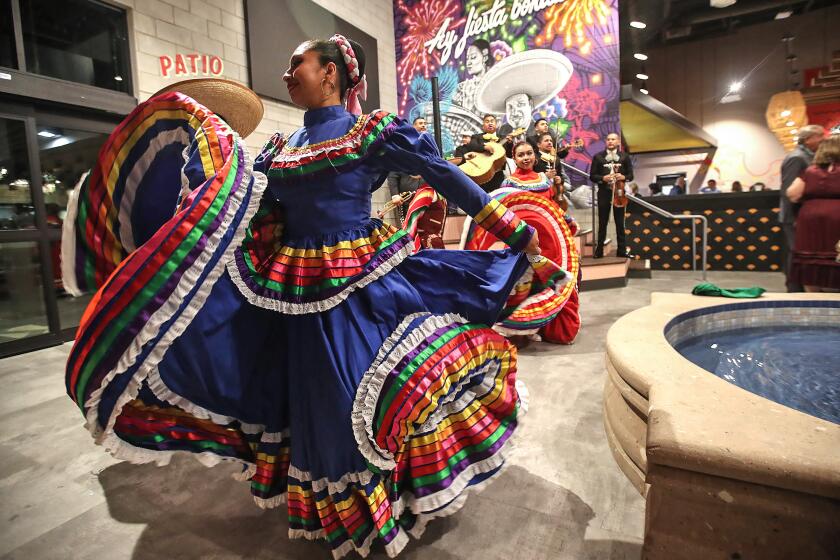A closer look at the puestos of the new Mercado González
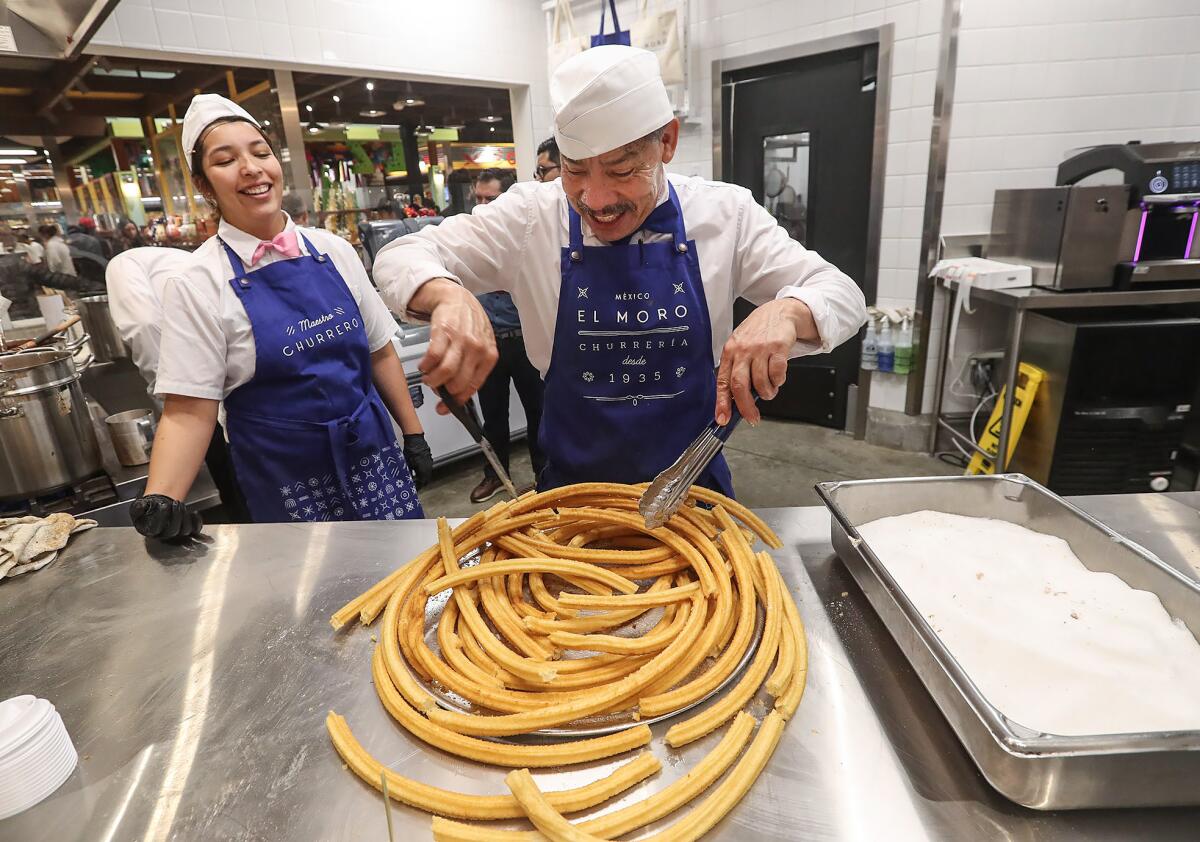
Walking into Mercado González at Northgate Market in Costa Mesa is a sensory overload.
The smell of freshly baked bread blends with the fragrance of sweet and smokey dried chile morita, simmering pots of menudo and even notes of artisanal soap. The pulsing sound of banda music coming from the mercado’s small stage floats through the air. Brightly colored murals by Mexican-born pop artist and muralist Claudio Limon are a feast for the eyes along with vibrant fresh flowers, festive piñatas and rainbow-colored produce. You’ll smile at the comfort of a warm Sonoran flour tortilla and feel compelled to run your hands along the smooth surface of hand-painted clay pots.
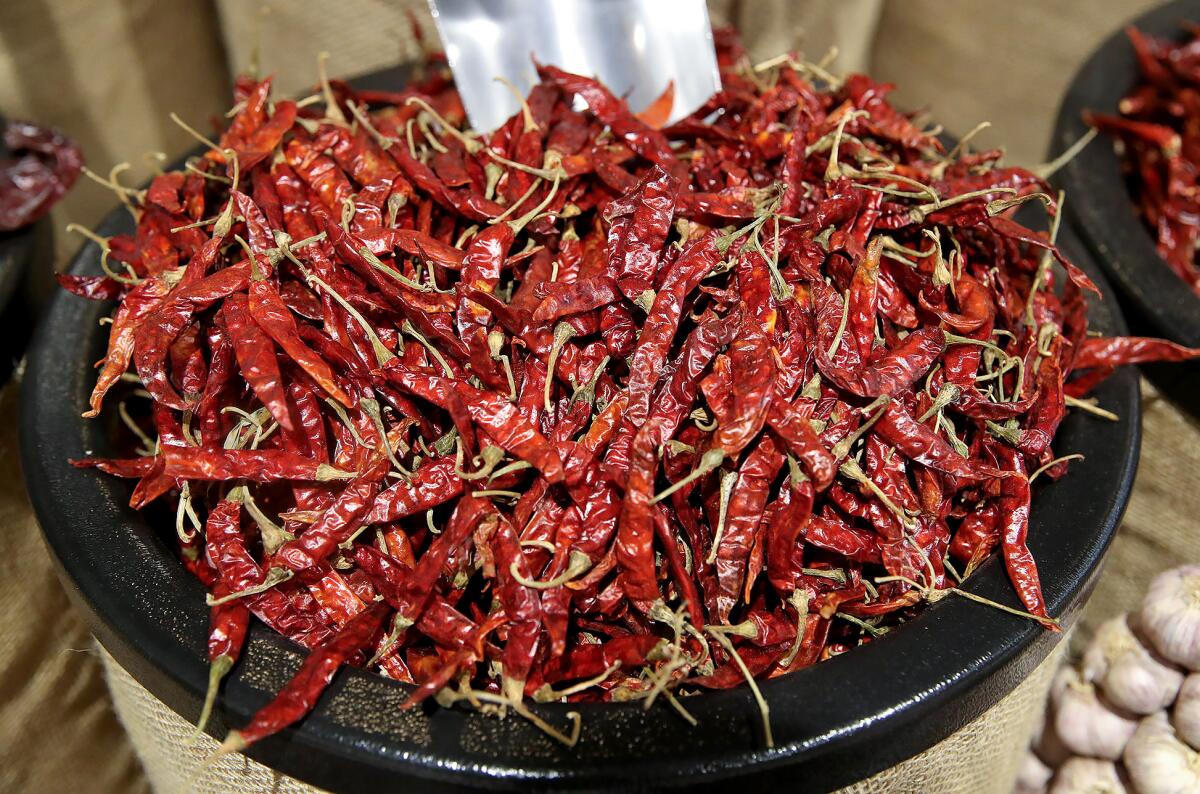
And then there is the food.
There is so much to taste at Mercado González. More than 20 puestos, or food stalls, fill the 70,000-square-foot market, which officially opened on Nov.17 at 2300 Harbor Blvd.
“The way I would describe it is, it’s a celebration,” said Manuel González, Northgate Market’s director, product development and food production. “It is a celebration of food, of people, culture, traditions, and it is bringing a little bit of Mexico to Costa Mesa.”
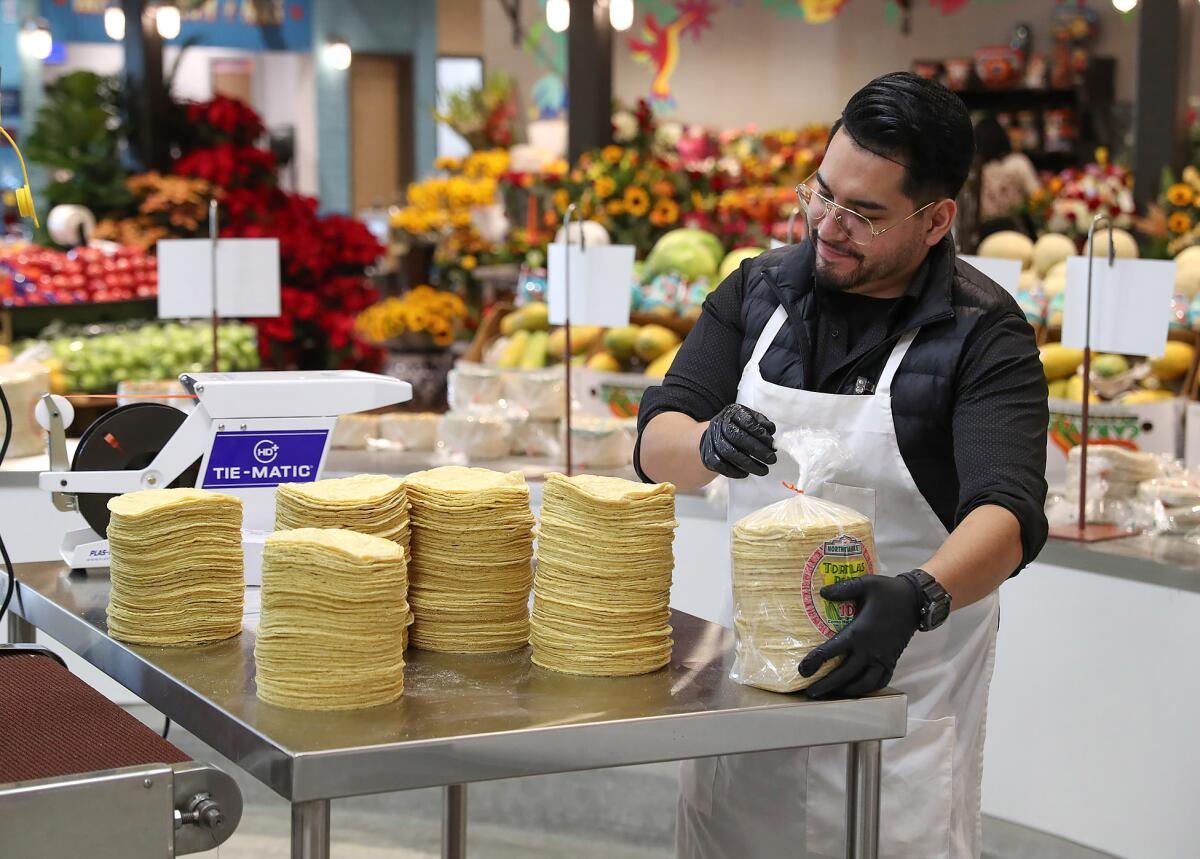
The feel, smell, sounds, sights and bites have left some customers overwhelmed with emotion.
Northgate Market’s senior vice president, Tom Herman, said a gentleman approached him in the store during the opening.
“He started to talk, but then he stopped and he turned his head and I knew he was crying,” said Herman. “While he caught his breath, I explained the market and gave him a little orientation.”
Once the man had composed himself, Herman said the man explained he was born in Mexico City.
“He said, ‘I have been here 40 some years and I have been waiting for something like this,’” Herman said.
Mercado González is easily the most ambitious venture of the Mexican grocery store chain that boast 43 stores in California. Founded by Don Miguel and Doña Teresa González, the first Northgate Market opened in 1980 on Anaheim Boulevard in Orange County. Today the company is owned by all 13 González siblings, and the new market builds on the González foundation for the next generation.
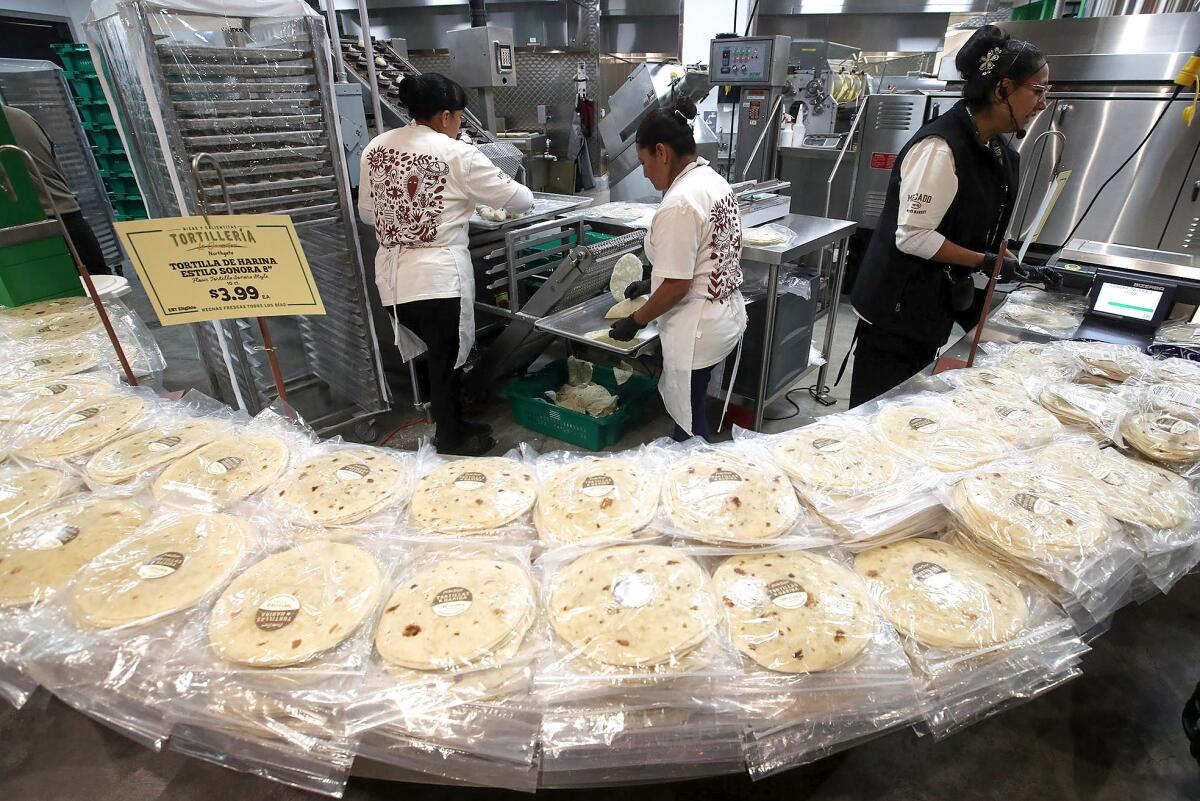
One way the mercado fosters a connection between the old and new is placing its famous tortilleria right at the entrance. For years, Northgate supermarkets have be synonymous with freshly made tortillas. Bags of masa, ground corn dough used to make tortillas, tamales, sopes, tostadas and more are sold for about $1.79 a pound. This weekend, Maria G. Sanchez handed out warm flour tortillas, swiping them with a slick of butter and pinch of salt before rolling them up and handing them out to eager customers.
At Carnitas Don Miguel, shoppers can find Michoacán-style carnitas made using the same recipe founder Don Miguel González Jimenez began using in the market in 1980. Carnitas are made fresh daily with Sal de Mar from Colima, Mexico, in traditional cazos, or large copper cauldrons. Coppersmithing was popular in Santa Clara del Cobre where copper mines were plentiful at one time and the P’urhépecha people fabricated cazos from the natural resource for rendering lard. Cazos filled with simmering pork are visible through the kitchen window where chicharron duro, buche, oreja, trompa, cuero and patitas are also prepared.
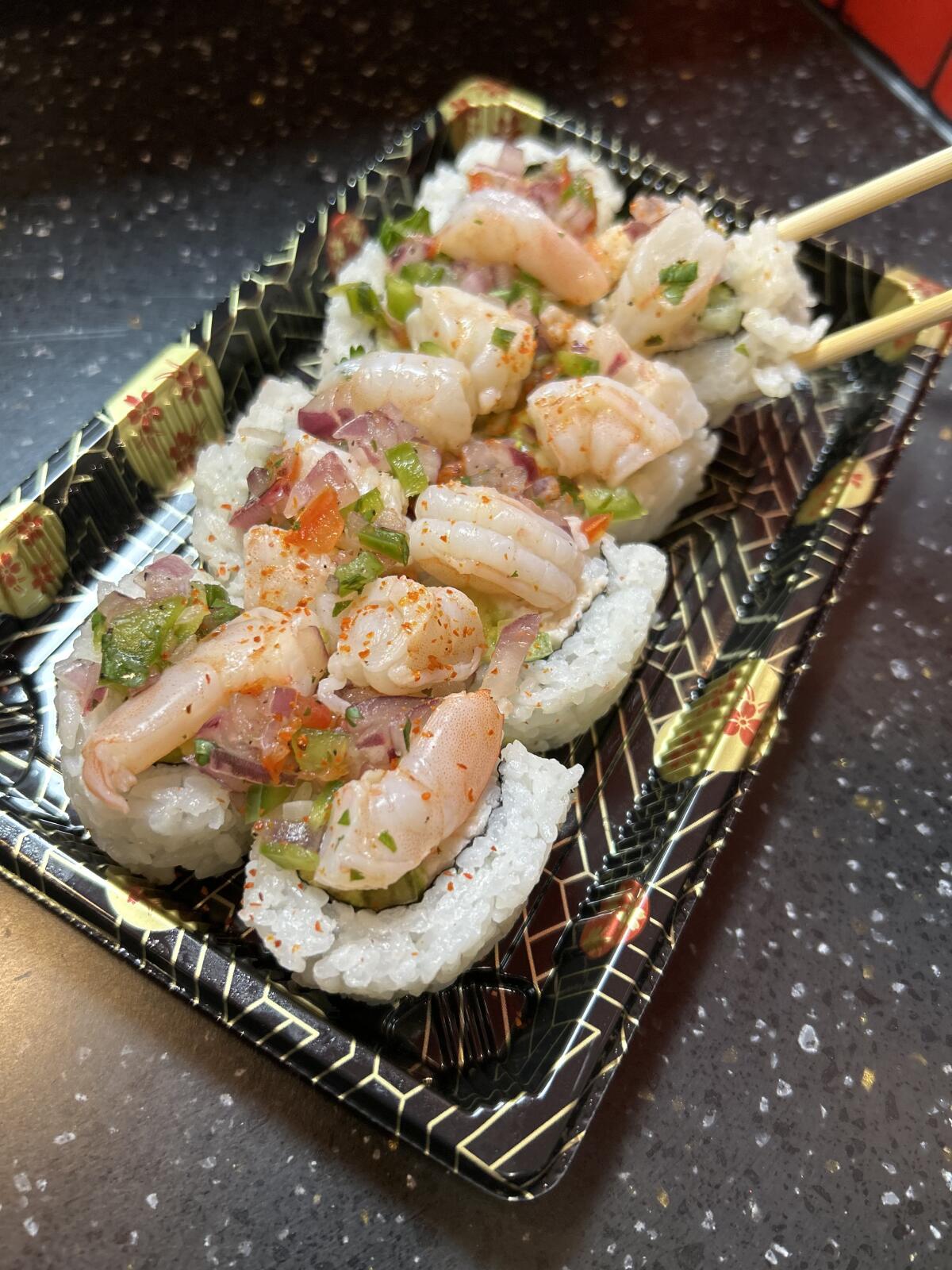
At Sushi El Sinaloense, Chef Luis Uechi brings his Japanese-Peruvian heritage to a style of sushi popularized in the Mexican state of Sinaloa. Inspired by the region’s fresh seafood, Sinaloan sushi relies on spices like chipotle or jalapeño in place of wasabi. At El Sinaloense, California rolls are topped with Sinaloan shrimp ceviche and a shrimp tempura and avocado roll is crowned with bluefin tuna and a pale green aguachile sauce that provides heat.
Tacos Los Güichos features the famed al pastor recipe of the Zenteno family, with Rodolfo Zenteno and Jesse Fernandez at the helm. Of course you can also choose from carne asada, pollo, chorizo, cabeza, suadero, lengua, tripas and even a vegetarian option.
Maizano, a masa-focused alta cocina fine-dining concept from Gruppo Apapacho, offers reprieve from the hubbub of the market inside its restaurant just off the main market behind the tortilleria. The restaurant group is also behind the Mercado González bar Entre Nos, serving micheladas, mezcal, tequila and Mexican beers. Gruppo Apapacho is responsible for Cha Cha Chá in Downtown L.A.’s Arts District and sister restaurant, Terraza Cha Cha Cha in CDMX.
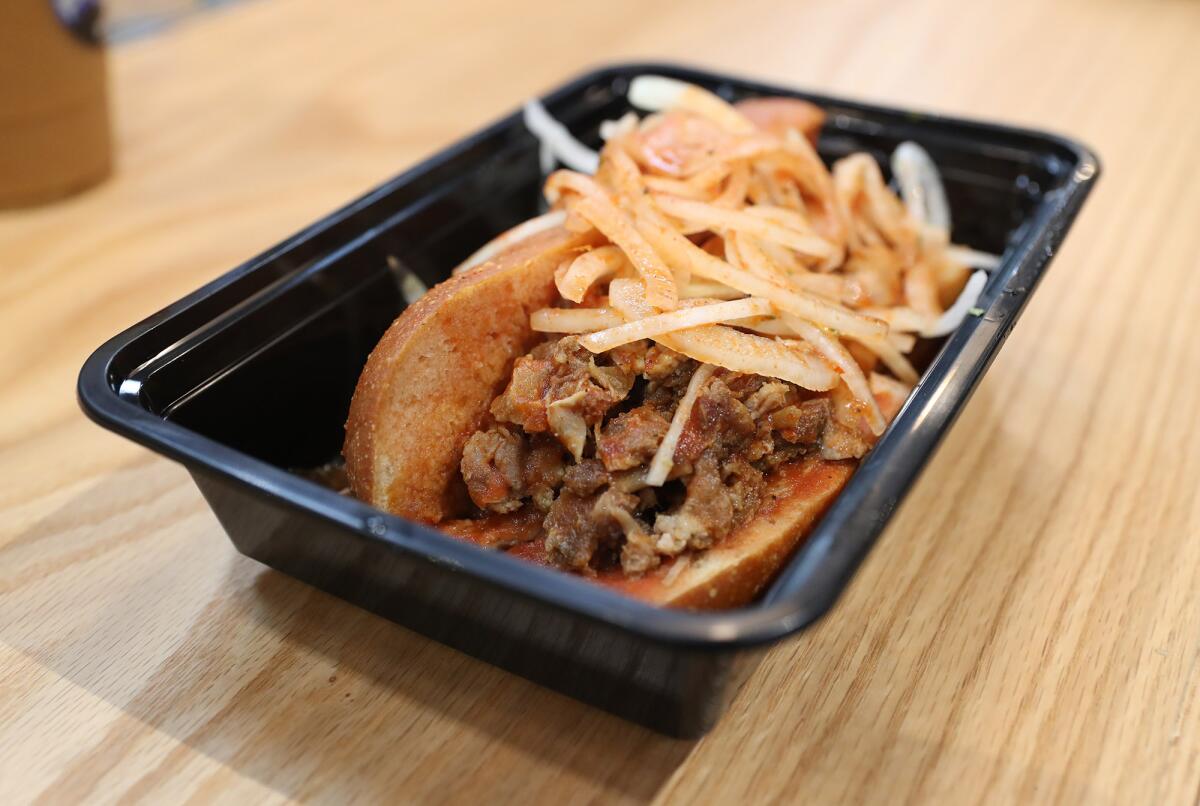
Santa Ana food-truck favorite Chivas Torta, which can usually be found on North Spurgeon Street, is now also among the vendors at Mercado González.
“Chivas Torta started 24 years ago, when my parents came from Guadalajara, Jalisco, and that was what they knew how to make,” said Alex Albarran. “They saw the demand and we continued it to this day.”
A 70,000-square-foot Mexican market and food hall on Harbor Boulevard is the first of its kind in Orange County. But if not for the pandemic, Mercado González might have been just another grocery store.
Chivas Torta is known for its signature torta ahogadas, a classic torta drenched in spicy broth served on a special bread made to stand up to the sauce and stuffed with beans, pork and pickled onions. It also serves tejuino, drink made from fermented masa, sweetened with piloncillo, or Mexican brown sugar and lime.
“Tejuino is a really popular drink in Guadalajara, and I don’t think many people in this store have tried it,” said Albarran.
Albarran’s parents are retiring, and he is carrying on the business along with his two brothers. The Chivas Torta truck will continue to serve workers and those looking for a quick bite, while he encourages families to visit their puesto at the market.
“The truck is an express version of this; this new project allows you to come in with your family and sit down and enjoy the store,” said Albarran.
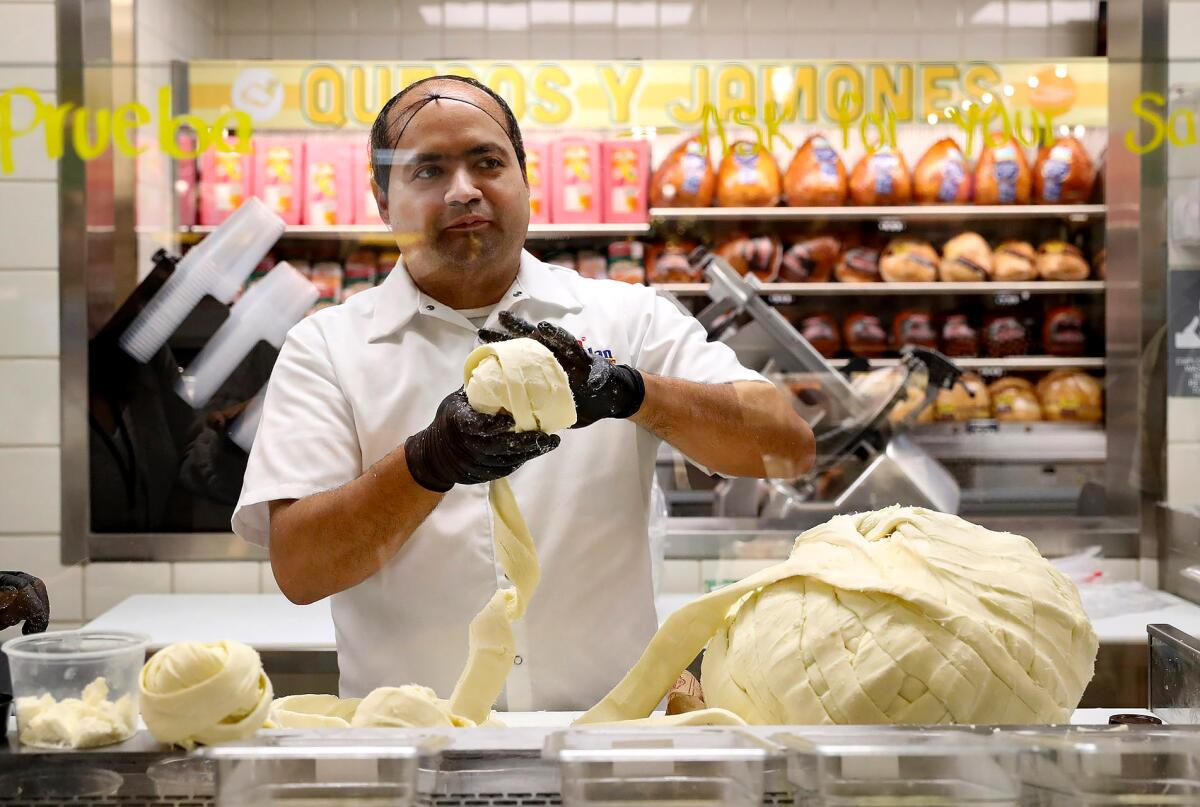
The market has managed to pull some heavy hitters, but González said sourcing the right vendors meant focusing on the food, rather than the brand.
“For us it was a lot more about selecting the food items,” said González. “It was about really understanding what our customers needed, what kind of experience you wanted to convey and then searching for the right food. To me, a vendor was secondary, it was more about who can support our vision and whether we would do it ourselves or reach out to somebody.”
Perhaps Mercado González‘s biggest get is Churrería El Moro. Hailing from Mexico City, El Moro is the one of the only puestos with its own front facing entrance in the market.
“El Moro is a family business that started in downtown Mexico City back in 1935,” said Santiago Iriarte, chief executive officer at El Moro. “A classic churrería where you can find freshly made churros, hot chocolate, and where you can have an authentic Mexican experience.”
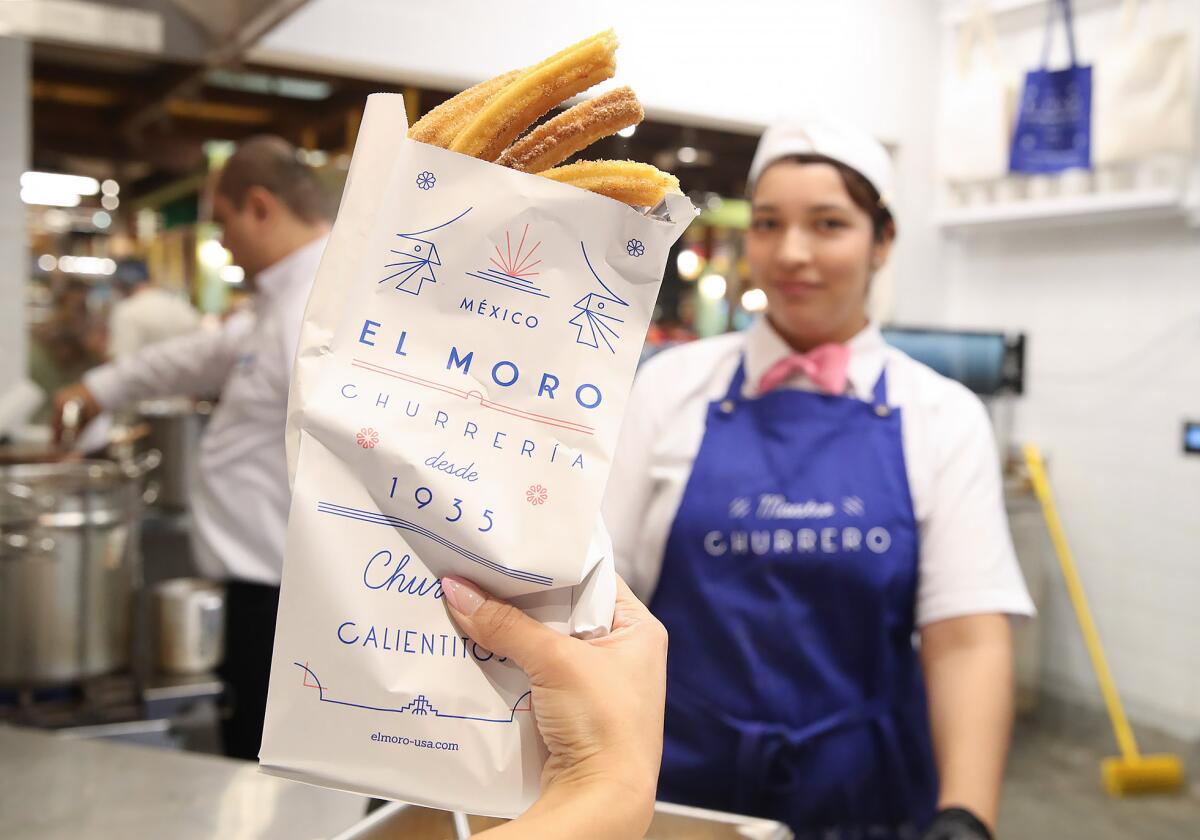
With several locations throughout Mexico, including the flagship in Mexico City that is a popular late-night hot spot, El Moro at Mercado Gonzáles is the first location in the U.S. Iriarte said he was drawn to the market by the González family.
“Especially Joshua González,” said Iriarte. “He came looking for us, and after realizing that they share the same values and that Northgate is a very loved brand such as El Moro, we knew they were the perfect partners for us.”
Other sweets include La Nena Paletaría, where Gonzalez, said the Northgate team developed nearly 300 recipes in their test kitchen, like the pistachio-flavored paleta which is both creamy and nutty and can be amped up by dipping it chocolate.
“We worked for over two years leading up to this and getting all the recipes,” said Gonzalez. “When I say developed; every recipe we had on file, we reviewed it, we made sure it was the best, we tasted it until we got the right product that we want delivered in our store.”
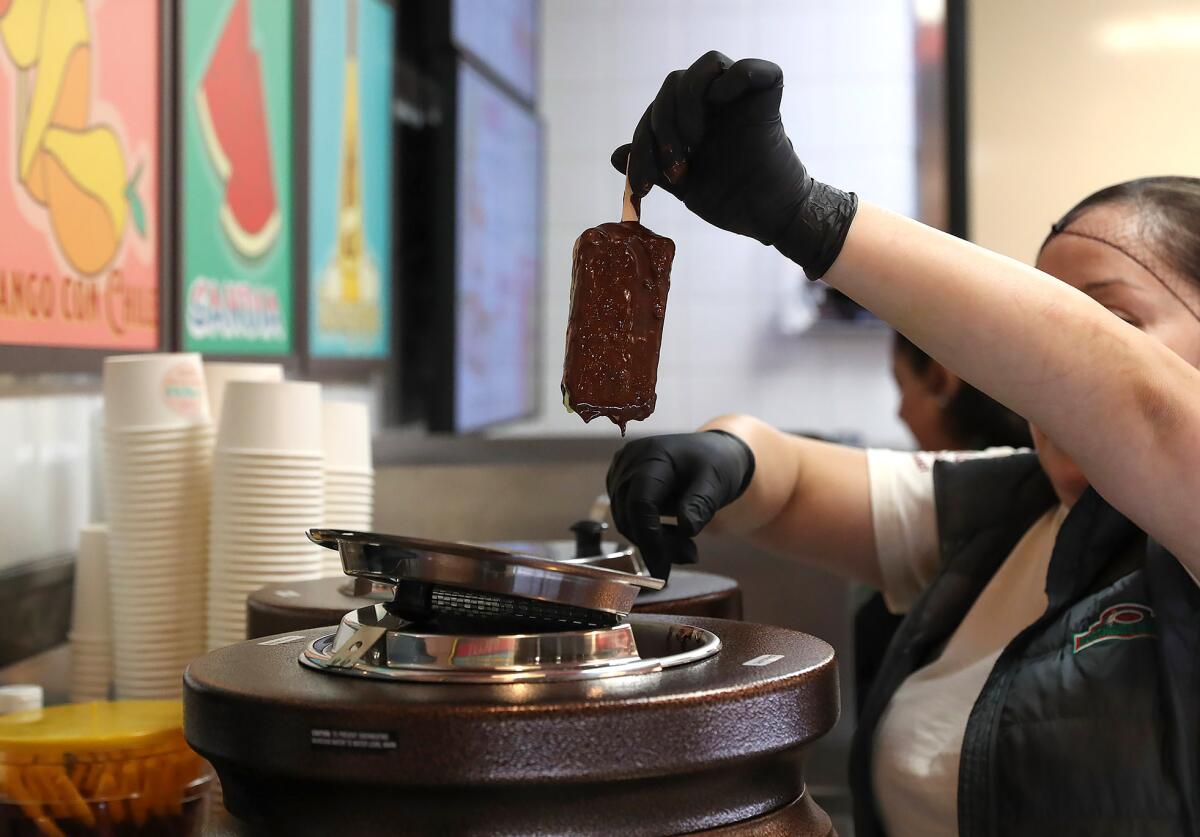
The same goes for the Pasteleria La González, where Gonzélez said nearly 200 recipes were developed.
“We revisited a lot of things and went back to doing it the way we used to do it,” said Arturo Robles, bakery director at Northgate. “I think we are giving the life back to bakery.”
Additionally, customers will find a La Tamalería serving tamales and hot champurrado, a dulceria, aguas frescas, a cremeria with all manner of Mexican cheese, a selection of tequila and mezcals at the Hacienda La Cofradia and ceviche, oysters and cotels from Marisqueria El Puerto.
“We have a variety of ceviches and aguachiles,” said Carolina Pinedo, manger at Marisqueria El Puerto. “We try to display seven to 10 on a daily basis. A majority of them are shrimp, but we also have a sea bass one which is a new recipe.”
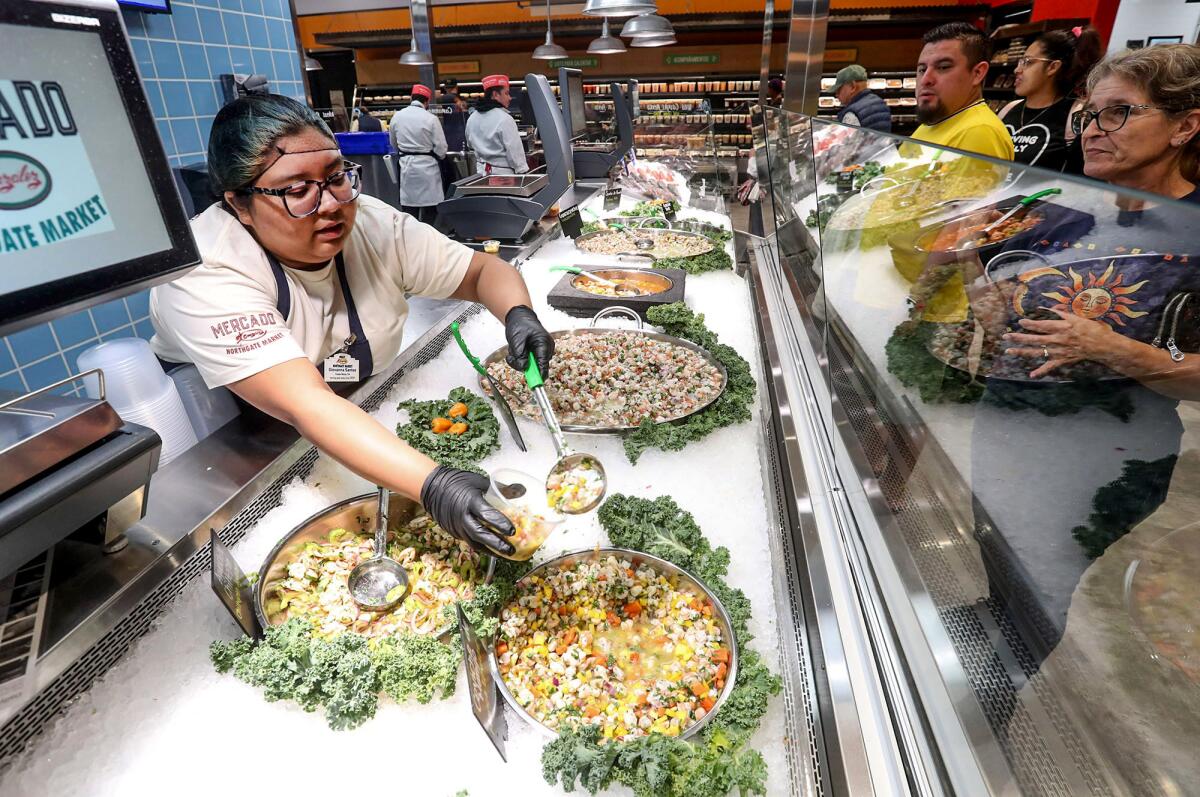
And like any good food hall, there are community kitchens built with the intention of supporting local entrepreneurs by giving them a platform to showcase their culinary talents.
“We have three spaces that are set apart with all the cooking equipment,” said González. “It is a shared space for people within our community that would like to start a restaurant or food business.”
The Community Kitchen will also offer guidance on obtaining food-safety certificates, business resources and more to help with its overall growth and success.
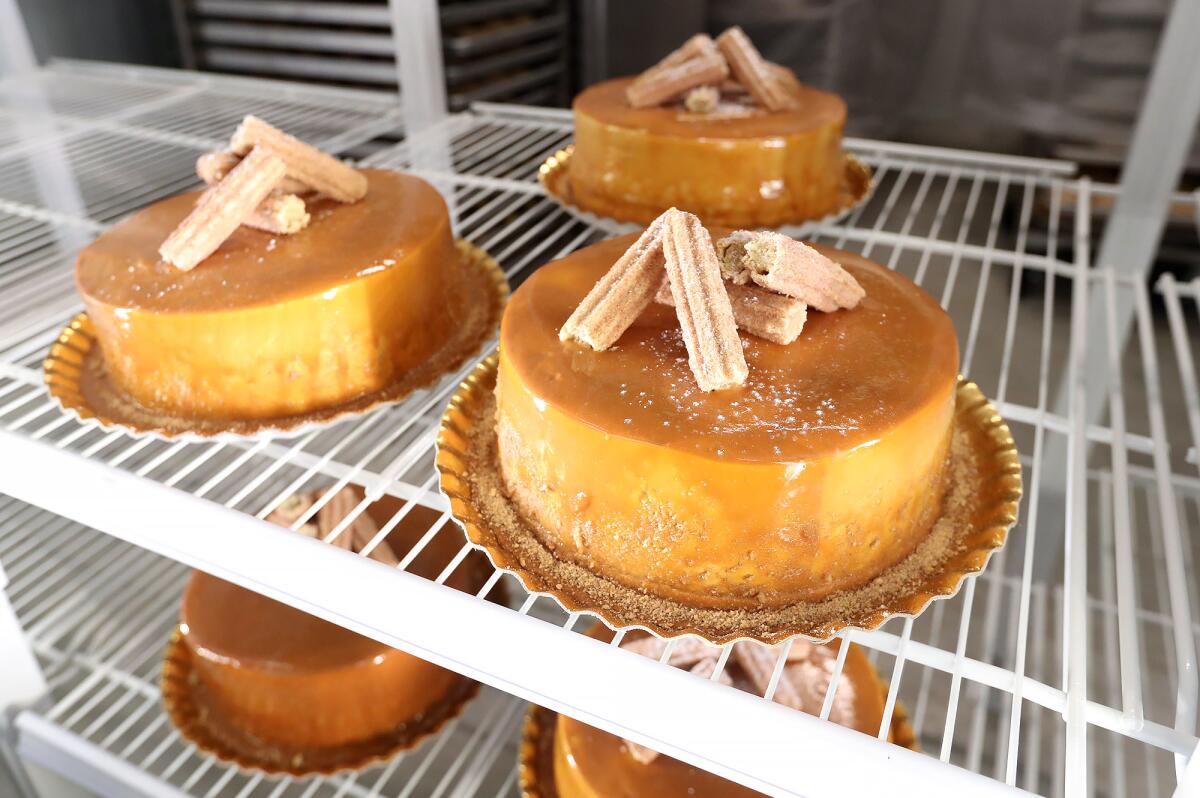
Whatever brings shoppers into the market, Herman said he wants customers to find something they can personally connect with.
“That is what we are trying to do,” said Herman, “is either expose people to the cultures, tradition and cuisine of Mexico, or if you are of Mexican heritage, to reconnect you to those traditions.”
All the latest on Orange County from Orange County.
Get our free TimesOC newsletter.
You may occasionally receive promotional content from the Daily Pilot.
